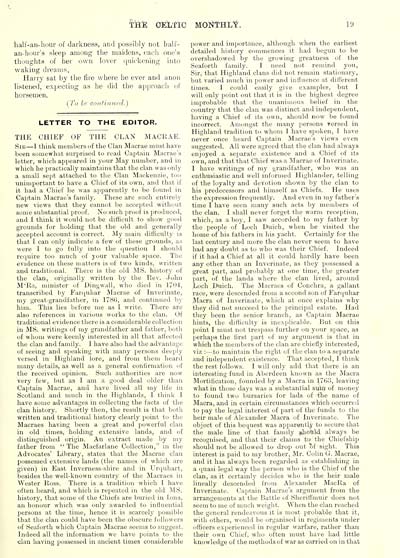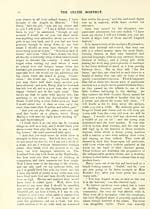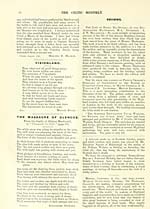Blair Collection > Celtic monthly > Volume 5, 1897
(35)
Download files
Complete book:
Individual page:
Thumbnail gallery: Grid view | List view

Tkfe OEIjTIC MONTHLt.
19
iialf-an-liour of darkness, and possibly not balf-
an-hiiiir's sleep among the maidens, eacli one's
thouglits of lier own lover qnirkeniug into
waking dreams.
Harry sat by tlie fire where he evei' and anon
listened, expecting as he did the approach df
horsemen.
(To hi' cnntuninJ.)
LETTER TO THE EDITOR.
THE CHIEF OF THE CLAN MACRAE.
Sir — 1 tliink members of the Clan Macrae must have
been somewhat surprised to read Captain Macrae's
letter, which appeared in your May number, and in
which he practicahy maintains that the clan was only
a small sept attached to the Clan Mackenzie, too
unimportant to have a Chief of its own, and that if
it had a Chief he was apparently to be found in
Captain Macrae's family. These are such entirely
new views that they cannot be accepted without
some siibstantial proof. No such proof is produced,
and 1 think it would not be dithcult to show good
grounds for holding that the old and generally
accepted account is correct. My main difficulty is
that I can only indicate a few of these grounds, as
were I to go fully into the ([uestion I shoidd
require too much of your valuable space. The
evidence on these matters is of two kinds, written
and traditional. There is the old MS. hi.story of
the clan, originally written by the Rev. .John
M'Ra, minister of Dingwall, who died in ITOt,
transcribed by Farquhar Macrae of Inverinate,
my great-grandfather, in ITlSti, and contniued by
him. Tills lies before me as I write. There are
also references in various works to the clan. Of
traditional evidence there is a considerable collection
in MS. writings of my grandfather and father, both
of whom were keenly interested in all that atl'ected
the clan and family. 1 have also had the advantage
of seeing and speaking with many persons deeply
versed in Highland lore, and from them heard
many details, as well as a general contirniation of
the received opinion. Such authorities are now
very few, but as I am a good deal older than
Cajjtain Macrae, and have lived all my life in
Scotland and much in the Highlands, I think 1
have some advantages in collecting the facts of the
clan history. Shortly then, the result is that both
written and traditional history clearly point to the
Macraes having been a great and powerful clan
in old times, holding extensive lands, and of
distinguished origin. An e.\.tract made by my
father from " The Macfarlane Collection," in the
Advocates' Library, states that the Macrae clan
possessed extensive lands (the names of which are
given) in East Inverness-shire and in Urquhart,
besides the well-known country of the Macraes in
Wester Ross. There is a tradition which I have
often heard, and which is repeated in the old MS.
history, that some of the Chiefs are buried in lona,
an honour which was only awarded to influential
Iiersons at the time, hence it is scarcely possible
that the clan could have been the obscure followers
of Seaforth which Captain Macrae seems to suggest.
Indeed all the information we have points to tlie
clan having possessed in ancient times considerable
power and importance, although when the earliest
detailed history commences it had begun to be
overshadowed by the growing greatness of the
Seaforth family. I need not remind you.
Sir, that Highland clans did not remain stationary,
but varied much in power and influence at ditt'erent
times. I could easily give examples, but I
will only point out that it is in the highest degree
improbable that the unanimous belief in the
country that the clan was distinct and independent,
having a Chief of its own, should now be found
incorrect. Amongst the many ])ersons versed in
Highland tradition to whom I have spoken, I have
never once heard Captain Macrae's views even
suggested. All were agreed that the clan had always
enjoyed a separate existence and a Chief of its
own, and that that Chief was a Macrae of Inverinate.
I have writings of my grandfather, who was an
enthusiastic and well informed Highlander, telling
of the loyalty and devotion shown by the clan to
his predecessors and himself as Chiefs. He uses
the expression frequently. And even in my father's
time I have seen many such acts by members of
the clan. I shall never forget the warm reception,
which, as a boy, I saw accorded to my father by
the people of Loch Dnich, when he visited the
home of his fathers in his yacht. Certainly for the
last century and more the clan never seem to have
had any doubt a.s to who was their Chief. Indeed
if it had a Chief at all it could hardly have been
any other than an Inverinate, as they possessed a
great part, and probably at one time, the greater
part, of the lands where the clan lived, around
Loch Duich. The Macraes of Conchra, a gallant
race, were descended from a second son of Fanpihar
Macra of Inverinate, which at once exjilains why
they did not succeed to the principal estate. Had
they been the senior branch, as Captain Macrae
hints, the difliculty is inexplicable. But on this
point I must not trespass further on your sjiace, as
perhaps the tirst part of my argument is that in
which the members of the clan are chiefly interested,
viz : — to maintain the right of the clan to a separate
and independent existence. That accepted, I think
the rest follows. I will only add that there is an
interesting fund in Aberdeen known as the Macra
Mortification, founded by a Macra in 1703, leaving
what in those days was a substantial sum' of money
to found two bursaries for lads of the name of
Macra, and in certain circumstances which occurred
to pay the legal interest of part of the funds to the
heir male of Alexander Macra of Inverinate. The
object of this bequest was apparently to secure that
the male line of that family should always be
recognised, and that their claims to the Chiefship
should not be allowed to drop out V sight. This
interest is paid to my brother, Mr. Colin O. Macrae,
and it has always been regarded as establishing in
a quasi- legal way the person who is the Chief of the
clan, as it certainly decides who is the heir male
lineally descended from Alexander MacRa of
Inverinate. Captain Macrae's argument from the
arrangements at the Battle of Sherifl'inuir does not
seem to me of much weight. When the clan reached
the general rendezvous it is most probable that it,
with others, would be organised in regiments under
officers experienced in regular warfare, ratlier than
their own Chief, who often must have had little
knowledge of the methods of war as carried on in that
19
iialf-an-liour of darkness, and possibly not balf-
an-hiiiir's sleep among the maidens, eacli one's
thouglits of lier own lover qnirkeniug into
waking dreams.
Harry sat by tlie fire where he evei' and anon
listened, expecting as he did the approach df
horsemen.
(To hi' cnntuninJ.)
LETTER TO THE EDITOR.
THE CHIEF OF THE CLAN MACRAE.
Sir — 1 tliink members of the Clan Macrae must have
been somewhat surprised to read Captain Macrae's
letter, which appeared in your May number, and in
which he practicahy maintains that the clan was only
a small sept attached to the Clan Mackenzie, too
unimportant to have a Chief of its own, and that if
it had a Chief he was apparently to be found in
Captain Macrae's family. These are such entirely
new views that they cannot be accepted without
some siibstantial proof. No such proof is produced,
and 1 think it would not be dithcult to show good
grounds for holding that the old and generally
accepted account is correct. My main difficulty is
that I can only indicate a few of these grounds, as
were I to go fully into the ([uestion I shoidd
require too much of your valuable space. The
evidence on these matters is of two kinds, written
and traditional. There is the old MS. hi.story of
the clan, originally written by the Rev. .John
M'Ra, minister of Dingwall, who died in ITOt,
transcribed by Farquhar Macrae of Inverinate,
my great-grandfather, in ITlSti, and contniued by
him. Tills lies before me as I write. There are
also references in various works to the clan. Of
traditional evidence there is a considerable collection
in MS. writings of my grandfather and father, both
of whom were keenly interested in all that atl'ected
the clan and family. 1 have also had the advantage
of seeing and speaking with many persons deeply
versed in Highland lore, and from them heard
many details, as well as a general contirniation of
the received opinion. Such authorities are now
very few, but as I am a good deal older than
Cajjtain Macrae, and have lived all my life in
Scotland and much in the Highlands, I think 1
have some advantages in collecting the facts of the
clan history. Shortly then, the result is that both
written and traditional history clearly point to the
Macraes having been a great and powerful clan
in old times, holding extensive lands, and of
distinguished origin. An e.\.tract made by my
father from " The Macfarlane Collection," in the
Advocates' Library, states that the Macrae clan
possessed extensive lands (the names of which are
given) in East Inverness-shire and in Urquhart,
besides the well-known country of the Macraes in
Wester Ross. There is a tradition which I have
often heard, and which is repeated in the old MS.
history, that some of the Chiefs are buried in lona,
an honour which was only awarded to influential
Iiersons at the time, hence it is scarcely possible
that the clan could have been the obscure followers
of Seaforth which Captain Macrae seems to suggest.
Indeed all the information we have points to tlie
clan having possessed in ancient times considerable
power and importance, although when the earliest
detailed history commences it had begun to be
overshadowed by the growing greatness of the
Seaforth family. I need not remind you.
Sir, that Highland clans did not remain stationary,
but varied much in power and influence at ditt'erent
times. I could easily give examples, but I
will only point out that it is in the highest degree
improbable that the unanimous belief in the
country that the clan was distinct and independent,
having a Chief of its own, should now be found
incorrect. Amongst the many ])ersons versed in
Highland tradition to whom I have spoken, I have
never once heard Captain Macrae's views even
suggested. All were agreed that the clan had always
enjoyed a separate existence and a Chief of its
own, and that that Chief was a Macrae of Inverinate.
I have writings of my grandfather, who was an
enthusiastic and well informed Highlander, telling
of the loyalty and devotion shown by the clan to
his predecessors and himself as Chiefs. He uses
the expression frequently. And even in my father's
time I have seen many such acts by members of
the clan. I shall never forget the warm reception,
which, as a boy, I saw accorded to my father by
the people of Loch Dnich, when he visited the
home of his fathers in his yacht. Certainly for the
last century and more the clan never seem to have
had any doubt a.s to who was their Chief. Indeed
if it had a Chief at all it could hardly have been
any other than an Inverinate, as they possessed a
great part, and probably at one time, the greater
part, of the lands where the clan lived, around
Loch Duich. The Macraes of Conchra, a gallant
race, were descended from a second son of Fanpihar
Macra of Inverinate, which at once exjilains why
they did not succeed to the principal estate. Had
they been the senior branch, as Captain Macrae
hints, the difliculty is inexplicable. But on this
point I must not trespass further on your sjiace, as
perhaps the tirst part of my argument is that in
which the members of the clan are chiefly interested,
viz : — to maintain the right of the clan to a separate
and independent existence. That accepted, I think
the rest follows. I will only add that there is an
interesting fund in Aberdeen known as the Macra
Mortification, founded by a Macra in 1703, leaving
what in those days was a substantial sum' of money
to found two bursaries for lads of the name of
Macra, and in certain circumstances which occurred
to pay the legal interest of part of the funds to the
heir male of Alexander Macra of Inverinate. The
object of this bequest was apparently to secure that
the male line of that family should always be
recognised, and that their claims to the Chiefship
should not be allowed to drop out V sight. This
interest is paid to my brother, Mr. Colin O. Macrae,
and it has always been regarded as establishing in
a quasi- legal way the person who is the Chief of the
clan, as it certainly decides who is the heir male
lineally descended from Alexander MacRa of
Inverinate. Captain Macrae's argument from the
arrangements at the Battle of Sherifl'inuir does not
seem to me of much weight. When the clan reached
the general rendezvous it is most probable that it,
with others, would be organised in regiments under
officers experienced in regular warfare, ratlier than
their own Chief, who often must have had little
knowledge of the methods of war as carried on in that
Set display mode to: Large image | Transcription
Images and transcriptions on this page, including medium image downloads, may be used under the Creative Commons Attribution 4.0 International Licence unless otherwise stated. ![]()
| Early Gaelic Book Collections > Blair Collection > Celtic monthly > Volume 5, 1897 > (35) |
|---|
| Permanent URL | https://digital.nls.uk/75851379 |
|---|
| Shelfmark | Blair.57 |
|---|---|
| Additional NLS resources: | |
| Attribution and copyright: |
|
| Description | A selection of books from a collection of more than 500 titles, mostly on religious and literary topics. Also includes some material dealing with other Celtic languages and societies. Collection created towards the end of the 19th century by Lady Evelyn Stewart Murray. |
|---|
| Description | Selected items from five 'Special and Named Printed Collections'. Includes books in Gaelic and other Celtic languages, works about the Gaels, their languages, literature, culture and history. |
|---|

